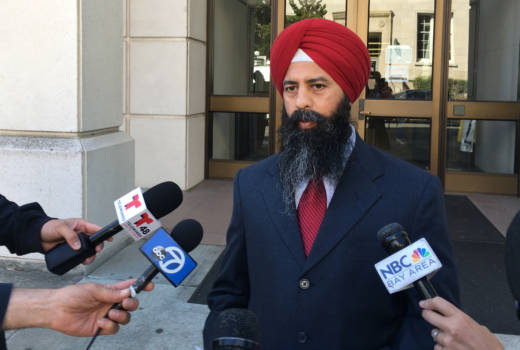Their prison stays will be completed in the coming weeks, in part because the state allows inmates in its firefighting program to get time off their sentences. They also got credit for several weeks they served in county jail and for good behavior while incarcerated.
The prosecutor who put Little and Leblanc behind bars was notified of their expected release dates by the Sikh Coalition, which learned of them from KQED.
Simon O'Connell, a Contra Costa County deputy district attorney, expressed concern that state prison officials had placed men convicted of assault with a hate crime enhancement in a program that allows inmates to shorten their sentences.
"Given the extent of what this crime was, I am disappointed that they were deemed to be both eligible as well as suitable for the conservation camp," O'Connell said in an interview.
"I hope that Little and Leblanc were placed in an ethnically diverse assignment," O'Connell said. "Perhaps then, their sentence was what Maan Khalsa stood for all along, an opportunity for these two men to experience the commonality that we all share regardless of color or faith."
The two men's release comes at a time when California has been working to reduce the number of inmates in state prisons. That effort has included moving more prisoners to county jails and reducing certain drug possession felonies to misdemeanors.
O'Connell said Little and Leblanc are benefiting from the state's effort to reduce prison overcrowding.
"This won't be the last chapter on this case," O'Connell. "Maan's experience will forever impact the way that I look at prosecuting."
Khalsa and the Sikh Coalition were initially under the impression that the two convicts would get a parole board hearing.
Khalsa said he had planned to urge the parole board to require that his attackers write a "sincere apology letter," that they get anger management counseling and take part in some sort of community service organization that promotes diversity.
"I truly hope you will impose these conditions so the cycle of Mr. Little's and Mr. Leblanc's terrible conduct stops with me, and they are exposed to the truth behind who I am," Khalsa said in a statement he now intends to send to state parole officials.
The CDCR's Patino said the two men are not eligible for a parole hearing and that the parole board will not look at their case.
Amrith Kaur, the Sikh Coalition's legal director, said the case was never about the severity of the punishment meted out to Little and Leblanc.
"Hate crime charges are not about enforcing a harsher criminal penalty, but rather confronting the impact that hate has on Sikhs and other religious minorities in America," Kaur said in a statement. "The idea of restorative justice is central to the Sikh ethos and we remain optimistic that Mr. Khalsa's attackers will learn that their bigotry has no place in our society."
Khalsa has filed a civil lawsuit against Little and Leblanc.
After the attack, the two refinery workers and another man initially suspected of being involved in the attack, Dustin Albarado, were fired from their jobs with Koch Specialty Plant Services, a repair and maintenance firm that works in the oil, gas and petrochemical industries.
At the time of the Sept. 25, 2016, assault, the Koch Specialty employees were in the Bay Area doing contract work for Chevron's Richmond refinery.
Khalsa's suit originally included Chevron and Koch Specialty, but a Contra Costa County judge dropped the companies from the action in March, ruling that the firms could not have foreseen that its employees would take part in the incident.
Khalsa's lawyer, Emile Davis of the San Francisco-based Dolan Law Firm, says he hopes he can depose Little and Leblanc before they're released from custody.
"The hate and violence suffered by Maan is unacceptable," Davis said.
Joseph Tully, a lawyer who represented Leblanc in the criminal case, called the incident "horrific." He said his client regretted his actions and hopes to transfer his parole conditions out of California after he's released.
Tully said Leblanc did not get any "free handouts" or "special favors" that led to his early release.
Little's lawyer, Julia Jayne, said she presumes her client wants to return to Texas.
"I haven't seen him since sentencing but I am sure he regrets the entire incident," Jayne said in an email.
KQED's July Small contributed reporting to this story.
